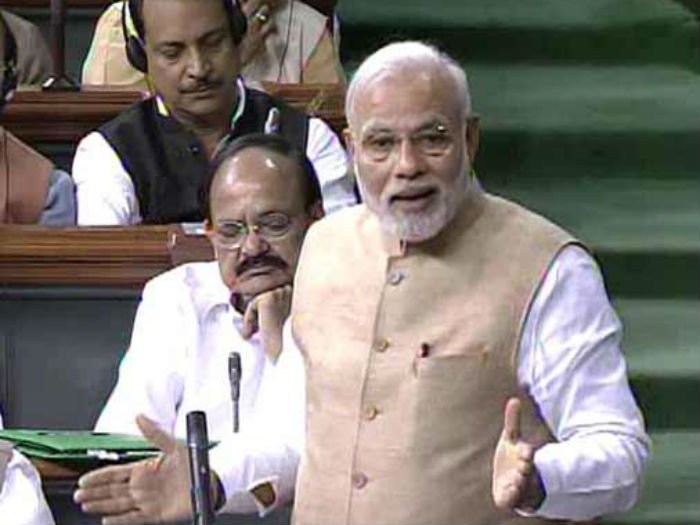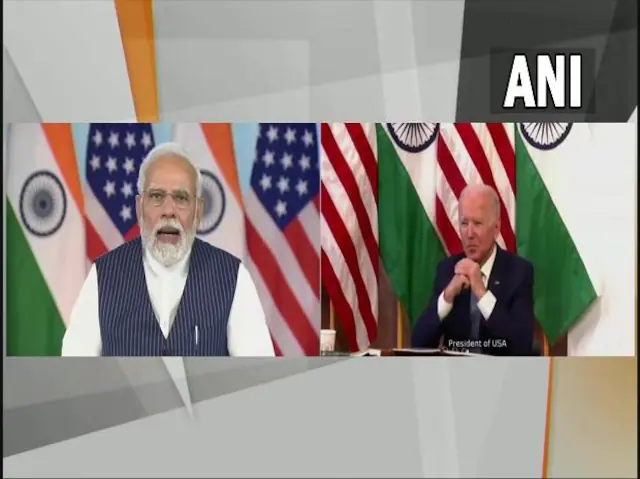
Prime Minister Narendra Modi on Monday, August 8, spoke on the Good And Service Tax (GST) bill in the Lok Sabha, here is how he defined this newly passed billed in the lower house.
Our aim is “Economical and educational empowerment of the poor”. GST can help us achieve this aim.
#GST will send across a message that ‘Consumer is the King’.
With #GST we intend to bring in uniformity in taxes. The message is clear that the ‘consumer is the king’.
‘Lok Tantra’ is not just a game of mandate, it is also a journey of forming consensus.
#GST-ek moti hum maala mein piro rhe hain jo ‘Ek Bharat’ ko taakat deta hai.
GST means ‘Great Step towards transformation’, ‘Great Step towards transparency’ in India.
It’s true that someone gives ‘birth’ while someone else ‘nutures it’ (on GST Bill). It is not a victory of a particular pol party.
Rashtraneeti’ is bigger than ‘Rajneeti’, says PM Narendra Modi in Lok Sabha
-Most of the things that can impact consumer inflation have been kept out of the ambit of #GST: PM Modi in LS
-The ‘kacha bill’ and ‘pakka bill’ system in our country has helped mobilise black money. GST will help put an end to this: PM Modi in LS
-We say a lot about corruption but to eradicate corruption it is important to strengthen our system as well: PM Modi in LS
-‘Economic dev of poor’ & ‘Educational dev of poor’-2 ways with which we cn build an Army of poor that’ll fight agnst poverty itself-PM in LS
-Our aim is “Economical and educational empowerment of the poor”. GST can help us achieve this aim: PM Modi in LS
– ‘Faith’ very important to strengthen federal structure of India. #GST will act as a catalyst in this regard-PM in LS
– It is true that consumer States will benefit more from #GST but Centre will compensate manufacturing States in case of losses: PM Modi in LS
– #GSTBill will act as catalyst to help strengthen trust between Centre and States: PM Modi in LS
– States in our country are not self sufficient but are interdependent. GST will boost economy of under developed States: PM Modi in LS
– ‘Rashtraneeti’ is bigger than ‘Rajneeti’, says PM Narendra Modi in Lok Sabha #GSTBill
– #GST will send across a message that ‘Consumer is the King’: PM Modi in Lok Sabha
– With #GST we intend to bring in uniformity in taxes. The message is clear that the ‘consumer is the king’: PM Modi in LS
– I held consultations with Sonia ji and Manmohan Singh Ji. We made efforts to take into consideration everyone’s suggestions: PM Modi in LS
– I had called Sonia Gandhiji & Manmohan Singhji to talk about #GSTBill. We have always tried to discuss this with everyone: PM Modi in LS
– ‘Lok Tantra’ is not just a game of mandate, it is also a journey of forming consensus: PM Modi in LS #GSTBill
– My experience as CM has helped me understand the problems of the states very well: PM Modi in LS
– This is not a victory of a particular party.It’s a victory of high democratic principles,victory of all political parties-PM Modi in LS
– GST means ‘Great Step towards transformation’, ‘Great Step towards transparency’ in India: PM Modi in Lok Sabha
– It’s true that someone gives ‘birth’ while someone else ‘nutures it’ (on GST Bill). It is not a victory of a particular pol party : PM in LS
– This example is good enough to understand the ups and downs nation has seen with respect to tax situation: PM Modi in LS
– You might know that some time ago an issue regarding tax came up in SC. Issue was Coconut should be considered a fruit or vegetable-PM in LS
GST, the biggest economic reform since 1991, is likely to sail through smoothly in the Lower House. It will replace a raft of different state and local taxes with a single unified value added tax system to turn the country into world’s biggest single market.
Earlier Updates from August 8
– Congress supports GST bill: Moily in Lok Sabha
– Stakeholders are plenty. We dont know their reaction on this. GST Council has to tackle all the states and UTs: Veerappa Moily
– But this House has been taken for a junior party. Rajya Sabha is given more importance. Although we dont have grudges: Veerappa Moily in LS
– Rates of taxation will be decided by GST Council: Arun Jaitley
– Centre has addressed concerns of all states on GST: Arun Jaitley
– GST is a massive reform in the country. I am thankful to all the political parties for making it happen: Arun Jaitley
– Future road map is that this is an enabling amendment, three more laws have to be created. Two of those have to come before Parliament: FM
– If one pays tax at one stage, they wont have to give another tax on that tax component. So tax on tax will be eradicated: Arun Jaitley in LS
– Govt at a fairly advanced stage in discussions with Andhra CM on special status; Will shortly arrive at a solution: FM Jaitley
– The government is trying to accommodate opinions of all the parties: Arun Jaitley
– Majority of political parties have supported GST Bill: Arun Jaitley
Prime Minister Narendra Modi is likely to intervene during the debate on the Bill in Lok Sabha.
The Bill was passed by Lok Sabha last year and now it has to go back to the Lower House for incorporating the amendments approved by Rajya Sabha.
Congress leader Jyotiraditya Scindia today said the party will support GST Constitutional Amendment Bill and has issued whip to all its MPs to be present in the House tomorrow where it is scheduled to be taken up for passage.
Aiming for early implementation of the Goods and Services Tax (GST), senior Union ministers have spoken to chief ministers of NDA-ruled states to ensure that the
constitutional amendment is ratified by state assemblies at the earliest.
The chief ministers have assured that, if required, they will call a special session for the passage of the Bill in their state assemblies.
The GST Bill has to be ratified by at least 16 states in 30 days after it is passed by Parliament. After facing fierce opposition over the Bill for almost a year, the government succeeded in bringing all major opposition parties, including Congress, on board and it was
passed in the Upper House with an overwhelming majority on August 3.
The Constitution (122nd Amendment) Bill, 2014, that would lay the ground for roll out of GST regime, was passed by the opposition-dominated Upper House after the government moved four amendments.
Once implemented, GST will subsume various taxes, including excise, services tax, octroi and other levies, and the proceeds will be shared between the Centre and the states. Under the new GST regime goods would be taxed at the point of consumption, instead of the goods being taxed multiple times at different rates.
The GST, which was first proposed a decade back, is seen as potentially transformative for India’s economy, adding as much as 2 percentage points to the GDP while also improving
the ease of doing business and encourage investment in manufacturing.
It is also expected to result in greater tax compliance, boosting government revenues.




